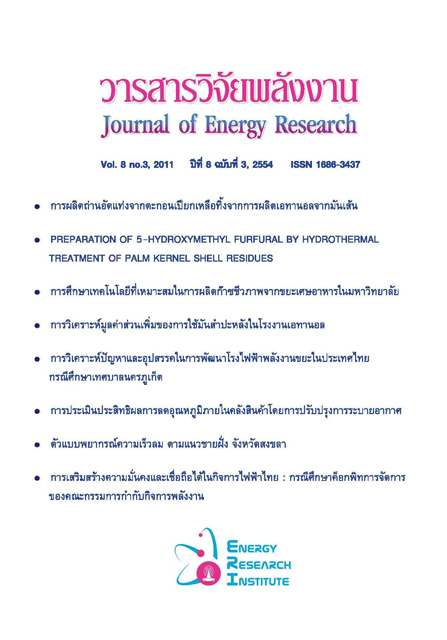การวิเคราะห์ปัญหาและอุปสรรคในการพัฒนาโรงไฟฟ้าพลังงานขยะในประเทศไทยกรณีศึกษาเทศบาลนครภูเก็ต
Main Article Content
บทคัดย่อ
การศึกษาเรื่องการวิเคราะห์ปัญหาและอุปสรรคในการพัฒนาโรงไฟฟ้าพลังงานขยะในประเทศไทยกรณีศึกษาเทศบาลนครภูเก็ต มีวัตถุประสงค์คือ เพื่อศึกษาผลกระทบต่อสังคมและสิ่งแวดล้อมของโรงไฟฟ้าพลังงานขยะในประเทศไทย ซึ่งเป็นปัจจัยที่สำคัญที่จะช่วยในการกำหนดแนวทางสำหรับการพัฒนาโรงไฟฟ้าพลังงานขยะในประเทศไทยในอนาคต โดยได้วิเคราะห์ข้อมูลจากแบบสอบถามและการสัมภาษณ์ผู้มีส่วนเกี่ยวข้อง เกี่ยวกับความคิดเห็นด้านการจัดการสิ่งแวดล้อมของเตาเผาขยะมูลฝอย ซึ่งข้อมูลที่ได้จะนำมาวิเคราะห์โดยใช้สถิติเชิงพรรณนา นำเสนอในรูปแบบของตารางแจกแจงความถี่ ร้อยละและค่าเฉลี่ย
ในภาพรวมปัญหาอุปสรรคที่สำคัญของโรงไฟฟ้าพลังงานขยะของเทศบาลภูเก็ต เกิดจากเรื่องกลิ่นเหม็นบริเวณรอบเตาเผาและฝุ่นควัน ซึ่งทำให้ประชาชนโดยรอบเกิดความไม่มั่นใจในด้านการจัดการสิ่งแวดล้อมของเตาเผาขยะมูลฝอยในภาพรวม อันจะเป็นปัจจัยหนึ่งที่ทำให้เกิดทัศนคติในแง่ลบต่อโรงไฟฟ้าขยะดังกล่าว ผู้ศึกษาจึงมีข้อเสนอแนะ เกี่ยวกับมิติต่างๆ ในการบริหารจัดการด้านสังคม และสิ่งแวดล้อม สำหรับการวางแผนการสร้างโรงไฟฟ้าพลังงานขยะในอนาคต โดยเน้นที่การปรับโครงสร้างแรงจูงใจในการบริหารจัดการ ตั้งแต่ต้นน้ำ ได้แก่การคัดแยกขยะ ไปจนถึงปลายน้ำ ได้แก่การตั้งโรงไฟฟ้า เพื่อให้ภาคเอกชนเข้ามามีส่วนร่วมในการดำเนินการและกระจายอำนาจในการตัดสินใจ ซึ่งสามารถออกแบบให้เหมาะสมกับแต่ละพื้นที่
Analysis of Problems and Barriers on Waste-To-Energy Power Plants in Thailand: the Phuket Case
The purpose of this study was to analyze the social and environmental impacts of waste-to-energy power plant development in Thailand, using the Phuket waste-to-energy plant as a case study. The result of this study could be use as a guide for developing future waste-to-energy power plants and for further study on the social and environmental impacts of waste-to-energy power plants in Thailand.
A questionnaire and interviews with were used to assess the social and environmental impacts of the plant. Data were analyzed by descriptive statistics and presented in the form of frequency, percentage and average.
Overall, the major problem associated with Phuket waste-to-energy plant is the odor from the waste and the fumes generated by the plant. This problem has caused negative impression about the plant in the surrounding communities and reduced public confidence in the plant’s environmental control overall. This study therefore proposes recommendations on aspects of environmental management, which will be useful for future waste-to-energy plant development. The recommendations emphasize the need to adjust incentive structures from upstream management, i.e., the sorting of garbage, to downstream management, i.e., power plant site selection. Such new structure of management is designed to invite more private sector’s participation and hence decentralize the decision-making to fit the need of each specific community.

